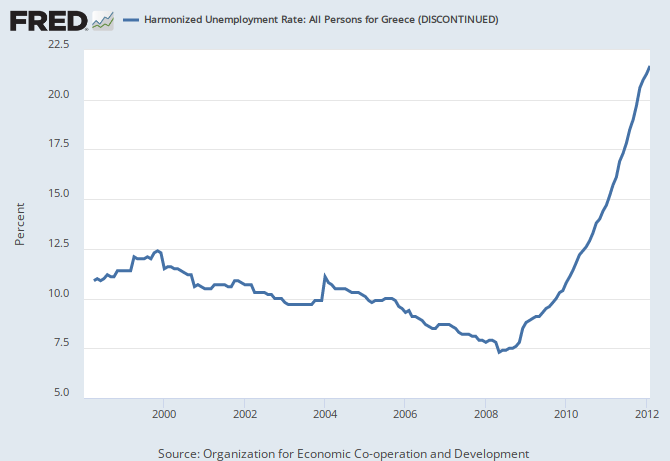 Financial
markets across the world plunged during the first two weeks of 2016. Global equity markets, for exmple, suffered the worst
first two week loss in 20 years. The problem is continued signs of severe
macroeconomic weakness which this
blog highlighted starting in late
2014, and throughout
2015. Thus, RBS
recently advised investors to sell everything to avoid a deflationary vortex.
Financial
markets across the world plunged during the first two weeks of 2016. Global equity markets, for exmple, suffered the worst
first two week loss in 20 years. The problem is continued signs of severe
macroeconomic weakness which this
blog highlighted starting in late
2014, and throughout
2015. Thus, RBS
recently advised investors to sell everything to avoid a deflationary vortex.
China in particular has slowed down, dragging
most other emerging markets down with it. Chinese
stocks are down nearly 20% just in 2016. Emerging markets shares have shed 35% since their recent peak
in 2014. Oil prices literally collapsed over the last year (see chart)
along with commodities generally, suggesting chronically weak demand. Non-energy commodities crashed
by 33% just since mid-2014. Thus, there will be massive financial losses
arising from emerging markets, China, energy, and commodities, much of it debt.
In fact, as recently as last week, the
megabanks started recognizing losses in their energy loan portfolios. While
the losses remain contained right now, one wonders what lies buried in the
derivatives books of the megabanks. One indication of the possible losses in
derivatives related to energy and other non-performing debt is the fact that
the megabanks lobbied successfully to continue selling FDIC-backed derivatives
within their banking subsidiaries, as
discussed in real time about a year ago on this blog. This indicates there
are likely more losses buried in the derivatives markets that logically should
end up hitting the capital of the megabanks. Further
weakness will inevitably lead to further loss recognition at the megabanks.
The Fed's recent efforts to hike interest
rates only exacerbates this global macroeconomic weakness. One commentator termed
the Fed's rate hike a policy "blunder." The case for a
deflationary vortex, first highlighted in late 2014 on this blog, now seems compelling.
The Fed seems as oblivious as it was in mid-2007 to the potential
for another financial crisis.
All of this
led George Soros to recently raise the specter of a financial crisis like 2008.
Soros, of course is a financial genius, with a long record of powerful
financial insights and trading successes. Betting against Soros is not a path
to success. Soros stated: "When
I look at the financial markets there is a serious challenge which reminds me
of the crisis we had in 2008.” Former US Treasury Secretary Lawrence
Summers recently stated: "the
global risk to domestic economic performance in the United States, Europe and
many emerging markets is as great as any time I can remember. It is time for
policymakers to hope for the best and plan for the worst."
Which brings me to the point of this post: Can policymakers count on the Dodd-Frank Act to save us from the horrors of 2008-2009?
In my next post, I will explain why the answer to that question is a resounding NO!















